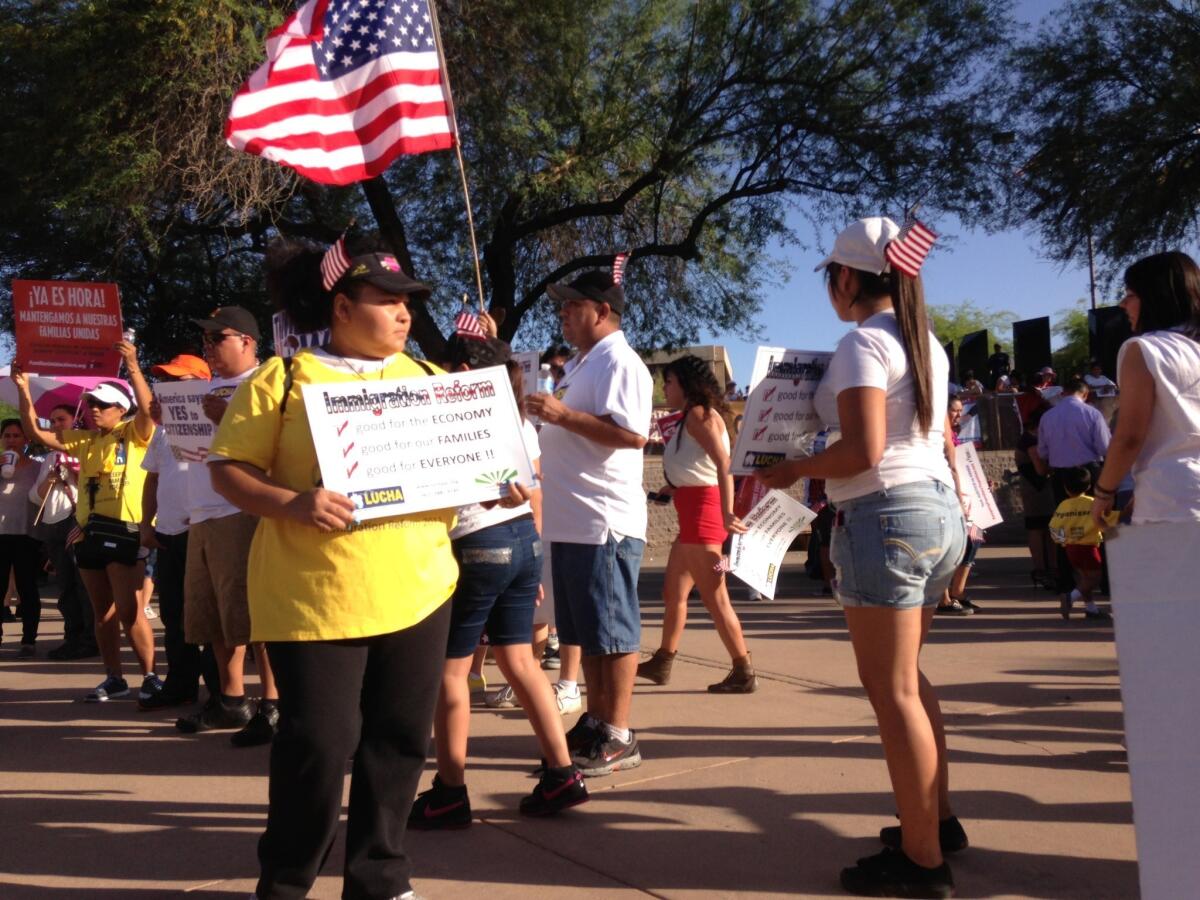May Day: Phoenix immigration rally includes workplace issues

PHOENIX — Brenda Juarez has been in this country so long that she doesn’t remember what Mexican state she was born in. She hopes she and her mother will be allowed to stay.
The two women joined about 300 people at Arizona’s state Capitol and thousands across the country at May Day rallies Wednesday, with comprehensive immigration reform the closest to reality it has been in years.
A bipartisan proposal by a group of eight U.S. senators includes a 13-year path to citizenship for most of the 11 million people who are in the country illegally, as well as a guest-worker program for future migrants.
Because Juarez’s mother, Alicia, brought her to this country when she was a toddler, Juarez, 24, received immigration relief under Obama’s Deferred Action for Childhood Arrivals program. That only lasts a couple of years, however, and whether it will be extended is unclear.
This is Juarez’s home, she told the Los Angeles Times. “We’ve been here for so long it’s hard for me to remember what I left behind.”
Alicia, 44, refused to give her last name, saying she fears deportation. “I want to be here legally. We need reform. I want to be able to work and walk in the streets without worry. I’ll be free,” she told The Times.
The turnout was small compared with the May Day marches of 2006, when huge crowds gathered in various cities, including 100,000 in Arizona’s capital.
But this year’s May Day rally was a sign of a better-organized immigrant rights movement, said Daria Ovide, spokeswoman for Central Arizonans for a Sustainable Economy, a worker advocacy group.
Since 2006, the movement has evolved. Organizers are targeting legislators and forging relationships between groups that have struggled to find consensus on immigration reform. One example: an agreement between the AFL-CIO and the U.S. Chamber of Commerce to support comprehensive immigration reform.
Phoenix’s May Day march reflects a matured national movement, Ovide said.
After the state Capitol rally, immigrant activists marched a mile and a half to join a union picket line at the Hyatt Regency hotel, where they demanded that an immigration overhaul include fairness for workers. The rally united two groups that rarely see eye to eye.
Mireya Mariscal, a banquet server at the Hyatt, marched in 2006 for immigrant rights and is now focused on demanding fairness for workers like herself.
“We have been attacked as immigrants and we have been attacked as workers,” said Mariscal, now a legal permanent resident. The single mother of four contends that she and other immigrants are treated unfairly by Hyatt Regency management because they don’t get as many hours as American citizens, which costs them healthcare benefits.
Mariscal said she also was demonstrating for those who are not legal residents. “I’m fighting for these people out there … the undocumented,” she said. “I was once out there, undocumented.”
Hyatt spokeswoman Katie Rackoff disputed the grievances. She said UnitedHere — a hospitality labor organization — is behind the picketing and is pressuring Hyatt workers to join the union whether they want to or not. The hotel chain has worked hard to create an inclusive environment where union representation is not necessary, Rackoff said in a statement to The Times.
“Our industry represents just one example of the contribution immigrants have made in shaping the United States and supporting its economy today,” the statement said.
A couple of hours before the joint picket at the Hyatt, Kathleen Pettycrew stood back and watched the rally at the Capitol.
“I believe it’s time for America to wake up and welcome people with open arms,” she told The Times.
Pettycrew, who has lived in Phoenix for 45 years, said the country needed more workers to contribute to the Social Security system that she and others would need when they retired.
“Many people who are white middle class do not have many children,” she said. “We need the workers. Immigrants are bringing skills that are needed.”
cindy.carcamo@latimes.com
ALSO:
Wounded Boston officer recovering, cracking jokes
May Day in New York: Protesting just about everything
Jamestown settlers ate 14-year-old girl, researchers say
More to Read
Sign up for Essential California
The most important California stories and recommendations in your inbox every morning.
You may occasionally receive promotional content from the Los Angeles Times.










